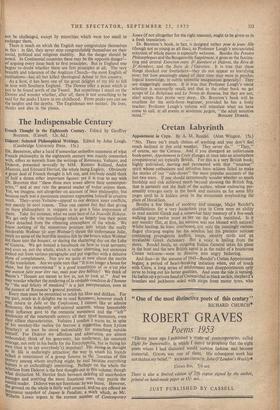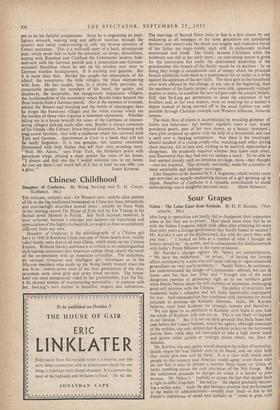Cretan Labyrinth
Appointment in Crete. By A. M. Rendel. (Alan Wingate. 15s.) "No. There isn't much chance of washing and you don't feel much inclined in this cold weather. They never do." "They," of course, are the Cretans. And if you disregard an unfortunate book-cover, Appointment in Crete plunges at once into an atmosphere conspiratorial yet typically British. For this is a very British book; highly individual, moving and permeated with that "amateur" spirit whose enthusiasm and initiative have seldom failed to make the stories of our "side-shows" the most popular accounts of the last two wars. If one should occasionally wonder whether so much hardship and risk achieved much beyond showing the British flag, that is certainly not the fault of the author, whose endearing per- sonality emerges early in the book and sustains us for some fifty pages until he is hidden away in the mountains overlooking the plain of Heraklion.
Besides a fine blend of modesty and courage, Major Rendel's qualifications for a very hazardous year in Crete were an ability to read ancient Greek and a somewhat hazy memory of a five-week walking tour twelve years ea.lier on the Greek mainland. • Is it any wonder tfiat, at first, his mission was not blessed with success? Whilst landing, he loses overboard, not only the cunningly camou- flaged charging engine for his wireless but his precious suitcase containing propaganda leaflets, maps, identity cards and an invaluable Greek dictionary. But a voice is hailing from the shore. Rendel lands, an outgoing Italian General takes his place in the boat and the'new British agent is in the midst of a boisterous Cretan welcome—soon to dissolve into angry bickering.
And thus—in the autumn of 1943—Rendel's Cretan Appointment begins; a period of heart-breaking initiation when, out of touch with Cairo, a long series of misfortunes and disappointments only serve to bring out his better qualities. And soon the tide is turning. He bwilds up a private band of Cretans clad in black sarikis, shepherd's breeches and jackboots soled with strips from motor tyres, who are to be his faithful companions. Soon he is organising an intel- ligence network, making long and difficult marches through the Country and vainly endeavouring to rally the diverse elements of Cretan resistance. This is a well-told story of a hard, adventurous year, which never fails to hold the attention; air-drops, demolitions, coping with Rosebud and Clubfoot the Communist leaders, hide- and-seek with the German patrols and a penetration into German- occupied Heraklion where he sets up his wireless next door to Germ,an wireless headquarters. It is exciting and genuine. But it is more than that. Rendel has caught the atmosphere of the Island; the mountains, the little villages, the plain shimmering With heat. He has caught, too, in a. dozen little portraits, its remarkable people; the members of his band, the guides and Shepherds, the hospitable, but dangerously loquacious villagers, the Archimandrite of the monastery where Rendel hides beneath the floor boards from a German patrol. Nor at the moment of triumph, amidst the flowers and shouting and the bottle of champagne does be forget the burnt-out villages and the white crosses which are the burden of those who organise a resistance movement. Whether taking tea in a house beneath the noses of the Germans or encoun- tering villagers picking snails after rain, Rendel is always conscious of his friends—the Cretans; brave beyond discretion, brimming with tragi-comic heroism, vital with a resilience which has survived both Turk and German. Appointment in Crete is a book that will not be easily forgotten. It is too genuine, too sincere; constantly Illuminated with little flashes that tell their own revealing story. "Well, Mr. Alexis," says Friar Tuck, the Orthodox priest with parachute wings, placing a chair amidst the ruins of his house, "I always said that one day I would welcome you to my home. As you see there's not much left of it but at least we can offer you



































 Previous page
Previous page